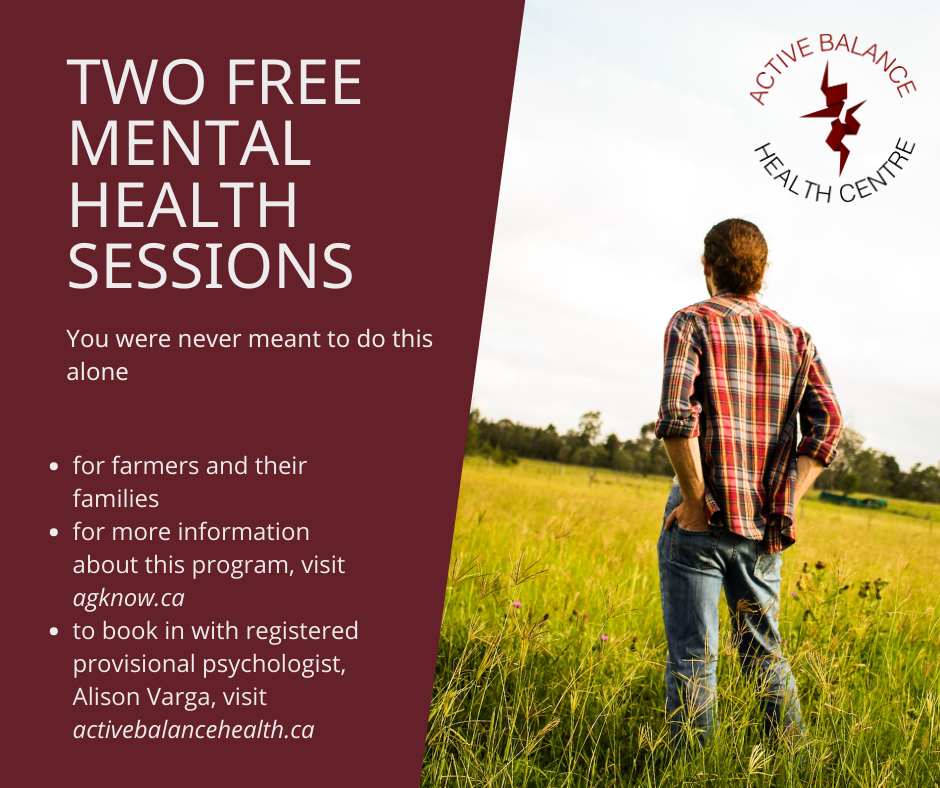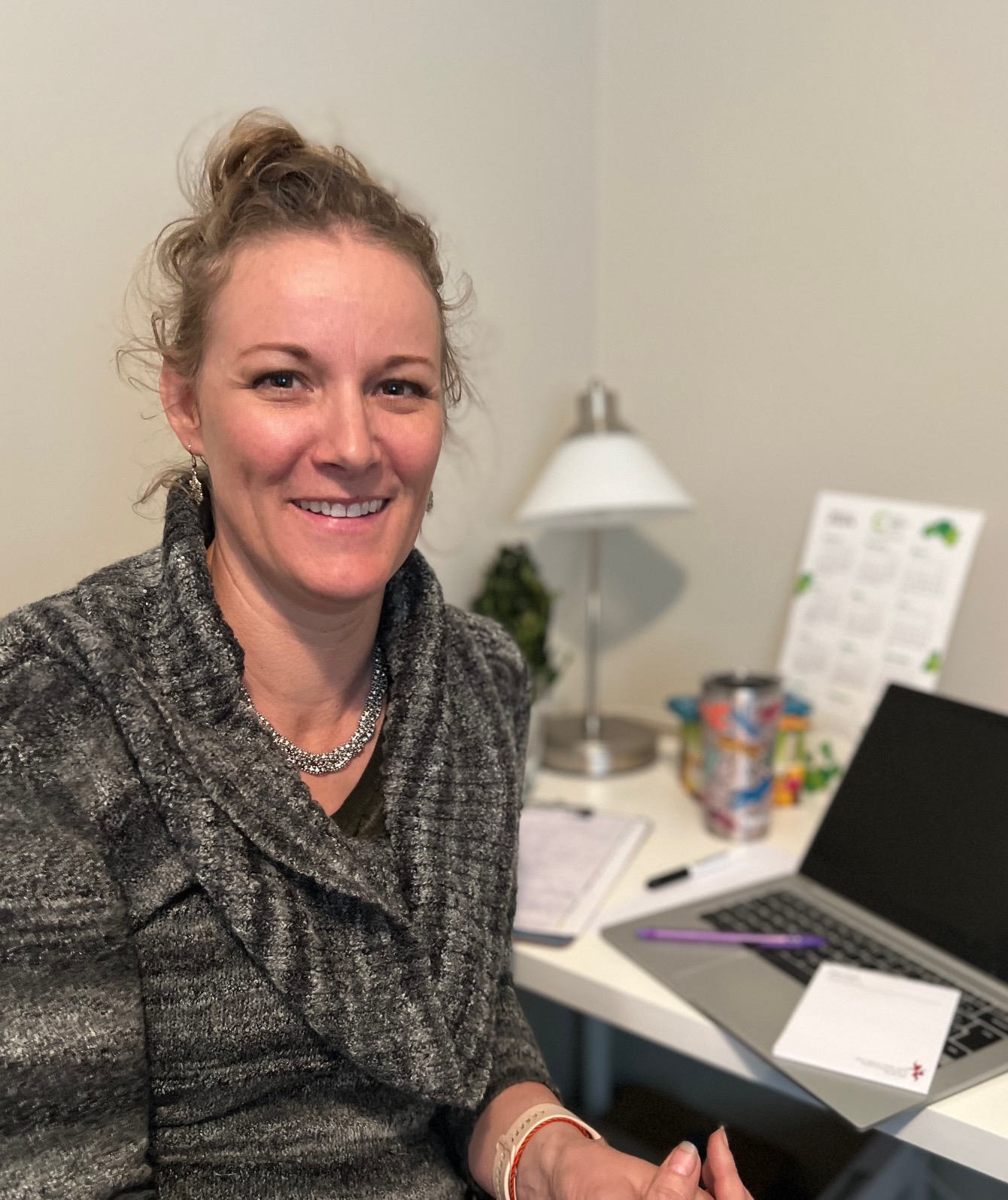Every time we turn on the news, we hear about Alberta’s drought. Drought affects more than our neighbouring farmers and ranchers. It also affects more than how green (or in reality – how brown) our lawns are going to be this summer. Believe it or not, drought can directly affect our mental health. Alison Varga is our Registered Provisional Psychologist and a rancher in the Foothills, directly west of Okotoks. She knows first hand how the lack of water can affect mental health and writes about it.
We invite you to read on…and if you are an Ag family (anywhere in Alberta), please know there is free support for you. More information is provided at the end of this blog.
Mental Health in Times of Drought
Alison Varga BA, MA, MCP, CCC
Provisional Psychologist

https://twitter.com/NSWRFS/status/1565201903041929217
It is commonly thought that poor mental health can be linked to rainy days and better mental health can be linked to sunny, warm days. Admittedly, I notice my mood improves when the sun comes out and the temperature gage creeps above the double digits after a cold winter spell or days of rainy gloom. Whether this is correct or not, “good” mental health is not that simple. We know that dark, gloomy weather or shorter, winter days with minimal daylight can lead to low mood or depression; however, what happens when unrelenting, sunny weather leads to similar moods?
I am sure every reader has been given the sage old advice of taking a Vitamin D supplement daily to help improve both their physical and mental health. Although this is helpful, my question is, what happens when there continues to be factors that are out of our control over and over again? What if this seems to be year after year or increasingly gets worse each year? What happens when the advice we have been given does not seem to be the fix we hope it will be or what happens if its effectiveness begins to wear off? How do we manage? This does not lead to a low mood, it can lead to stress, anxiety, depression, or trauma.
Certainly, weather plays a role on our mental health but, there are so many other factors that can negatively impact mental health in this day and age, specifically, the ease of access to different types of media. I read the other day that for one positive message on social media, a person is exposed to over 100 negative messages. Although I did not go out of my way to verify the validity of that statement, I do not doubt it. It is human nature to be drawn to and perceive negative information as more valid and truthful, which is known as the “Negativity Bias” in the world of mental health/psychology. It would, therefore, make sense that there are so many more negative messages than positive ones (especially used by politicians!). Simply put, negativity sells. We pay more attention to it and we easily believe it. It is click bait and it plays a starring role in how our brain operates by impacting how we think, respond, and feel.
It is hard to look at any form of media or social media without being bombarded with the negative effects of global warming, climate change, forest fires, water restrictions and extreme drought. Currently, in the Foothills and across Alberta, there is the very real threat of serious drought conditions continuing from last year. We are all too familiar with the seriousness of drought financially, emotionally, and physically. In the 1930’s, the Great Depression was sparked by one of the most intense drought periods in US history. Drought wreaked havoc again in the 1950s and the 1980s. Over the past 50 years, many States, Provinces, and Counties have declared varying states of emergency and, in our own backyard, the Foothills County declared an agricultural state of emergency last year which has sparked the Alberta Government already preparing for severe drought conditions this year.
I’m sure this comes as no surprise, but we live in a rural community. If you drive to the city, you pass farms; drive to the mountains, you pass fields of crops; drive to the States or the coast, you guessed it, you’re going to pass a farmer’s field or two. In those fields are either valuable crops or livestock. No matter what is in those fields, they contain farmers livelihoods. Their heart and soul. Their bread and butter. Their last dollar.
One step closer to home, here in Okotoks residents are constantly plagued by level one, two, or three water restrictions. We get colour coded fire hazard signs as you drive along highways explaining the risks associated with the dry conditions. Right now, we are green, meaning the risk of fire is low but it only takes one windy day due to chinook winds and we can jump up to the high-risk range in the blink of an eye. This uncertainty can be unsettling at the very least for a majority of us, but it can be extremely detrimental to a person’s mental health if you happen to be a farmer, a first responder, or someone who is impacted by chronic pain, Seasonal Affective Disorder, Post-Traumatic Stress Disorder, anxiety, depression, or any other mental health or medical condition that is impacted by weather.
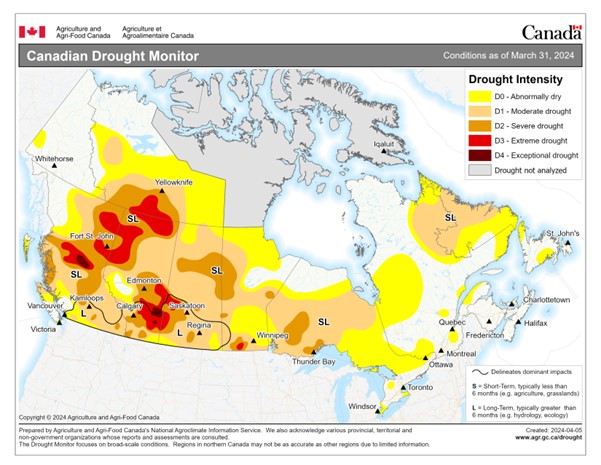
https://agriculture.canada.ca/en/agricultural-production/weather/canadian-drought-monitor/current-drought-conditions#a4
With last year’s agricultural disaster declared quite early in the season, it is no surprise we seem to be preparing for the worst this year. The predicted drought conditions of 2024 are causing many of us to pause and take note and, as a therapist who works closely with and lives in an agricultural community, this prediction is truly disheartening. The costs of seed, fertilizer, machinery, gas, feed prices, utilities and now the increase in carbon tax all add up and is becoming prohibitive to the point that it is leading to farmers walking away from crops, their land, selling their livestock for pennies on the dollar, or even selling their farms. When something a person has spent their entire life building up and their life savings investing in, is solely dependent on the weather, undoubtedly, their mental health and well being is going to rely on weather as well!
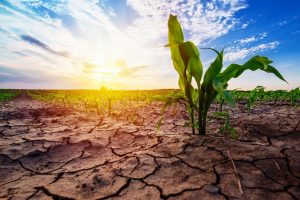
https://lanesinsurance.com/alberta-drought-and-warm-temperatures-worrying-for-farmers/
I suspect that, if the predictions are true and we do face drought conditions, anxiety will be high and will continue to escalate as the costs continue to skyrocket. Depression will rear its ugly face when crop yields are at a bare minimum due to minimal moisture levels and profit margins are less than optimistic or are non-existent. It will be even worse if a farmer is at risk of losing the farm. When we stare up at the sky, and there is yet another sunny, hot, dry day with no dark gloomy, rainy days on the horizon, it definitely does seem to be counterintuitive to the belief that people only suffer from depression on cold, rainy days.
Farmers aside, there are also severe risk factors associated with first responders’ mental health when we face the risk of drought conditions. The unpredictability of forest fires is well known but one of the highest risks to fire fighters is grass fires. These fires also threaten our neighbours, the farmers, along with our community. The devastation caused is parallel to none and can destroy not only the first responders, but the farmers, their families, and the animals/livestock they care for. Finally, drought conditions can negatively impact people living in towns, specifically, here in Okotoks. Unless you already have a zero-maintenance garden, it will be very difficult to spend time in and enjoy your garden if there are water restrictions from the onset of growing season.
Gardening is a proven therapy for depression, it is known as Horticultural therapy. This is a therapeutic approach I not only utilize in counselling sessions for my clients, but it is also something I closely align with and engage in for my own mental health on a regular basis. It is safe to assume, then, that we may see a spike in depression if people are not able to enjoy their gardens the way they would like. This is because exposure to gardening and nature, in general, reduces stress hormones and anxiety. Being outside and connecting with nature has long been encouraged for physical health; however, research has frequently demonstrated that it decreases stress hormones and has a positive impact on heart rate, blood pressure, brain waves, and even protein markers. In 1991, Roger Ulrich developed the Stress Reduction Theory and noted that exposure to nature creates positive emotions and feelings, where there is a restorative effect on a person’s mental health in general. Gardening encourages a person to spend time outdoors, exposing them to sunlight which provides Vitamin D and encourages the brain to release Serotonin, the “feel good” hormone. Gardening also helps a person focus, release stress, and practice mindfulness (which is especially helpful for people who may struggle with formal mindfulness exercises, such as children or people with ADHD). Finally, gardening and connecting with nature gives people an opportunity to get some much-needed exercise, especially when a significant amount of our life is sedentary.
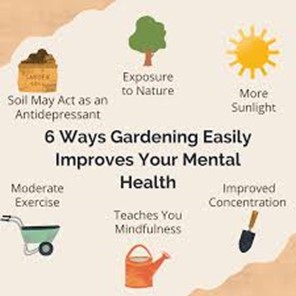
*Photo from The Brain Foundation
If the opportunity to get into the garden and connected to nature is limited or completely restricted because of drought conditions and water restrictions, we may see a surge in mental health issues in children and adults alike. It may be difficult to recognize initially as we do not always attribute depressive symptoms to “good weather” and dry conditions. So, how do we combat this then? The answer is, we need to become creative.
I am not a horticulturalist by any stretch of the imagination, but I recently discovered growing seeds in 4L milk cartons. What is fun about this approach to growing plants of any kind is that it utilizes a “benign neglect” approach where, once you have put dirt into the milk cartons, planted the seeds, and taped the milk carton back together, you allow mother nature and basic science behind creating a “mini greenhouse” to do the rest. Then you plant these new plants into your garden and hope for the best. Simply the act of playing in the dirt in February boosted my mood. What is even better, is that this is recycling, reusing, and reducing at the same time, which is helping our environment. Once my little experiment was done and I put the last piece of tape on my final milk carton, I scattered the mini, milk-jug greenhouses around my garden in snowbanks to let nature do everything else. I surprisingly celebrated this last snowfall rather than the usual dread I feel (and migraine) because it meant there will be more moisture for my plants to potentially grow – no watering necessary!

My daughter and I doing our milk jug greenhouses
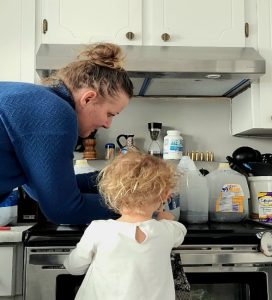
Two year olds are very interested!
While I await my mini greenhouses to do their thing and hope for the best, I note that I am feeling something else that leads to better mental health outcomes. Hope. Research has shown that hope plays a significant role in treatment outcomes for people facing serious health problems, such as cancer and chronic pain. Hope is an emotion that leads to anticipation, excitement, interest, and peace. The mind-body connection becomes evident when you factor in hope. It is then safe to assume that this hope and anticipation of my milk carton greenhouses can help improve my own mental health which, in turn, helps me maintain best practice and show up for my clients each and every day.
Therefore, my solution to no rain is finding ways to utilize what we are dealing with and what we have available. Aside from turning our entire gardens into oversized sand, zen gardens, we may have to become creative to find ways to get into our gardens or at least get into nature safely. Although I cannot change whether we may experience a drought of any magnitude this coming spring/summer, I would still encourage readers to find ways to get outdoors, get into their gardens, and get their hands dirty. Find ways to conserve water (rain barrels) so you can sparingly water what plants you do decide to grow. I encourage compassion and kindness toward our farmers and first responders, especially when the sun relentlessly comes up every morning and there is no rain forecasted in the horizon. It may seem counterintuitive, but they could be struggling with their mental health because of those sunny, dry, drought conditions.
~~~~~~~~~~~~~~~~~~~~~~~~~
AgKnow, Alberta Farm Mental Health Network, provides free therapy sessions to farmers and their families. Alison is just one of their therapists providing in-person and virtual confidential counselling sessions. If you have questions or know someone who is struggling, we invite you to reach out to her. She can be reached by:
- booking a complimentary Meet & Greet appointment (in-person or virtual) at activebalancehealth.ca
- calling the clinic 403.993.6337
- emailing: therapy@activebalancehealth.ca
- connecting through the AgKnow website
